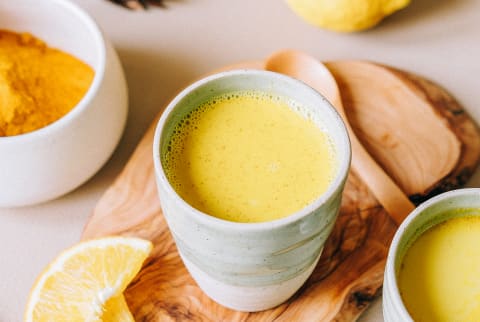Advertisement
Research Shows This Spice May Help Reduce Inflammation In Your Brain


A dash of spice can go a long way—even when it comes to combating inflammation in your body. In fact, studies show that eating ½ to 1 teaspoon of turmeric daily1 is enough to improve inflammatory markers in the body. And research on turmeric supplements may have an even more profound effect, especially when it comes to brain health.
The thing is, you have to have the right form of turmeric for it to be beneficial. Here, we dive into a new research review2 that summarizes what we know so far about turmeric's brain-supporting capabilities and what can make these supplements even more effective.
What makes turmeric anti-inflammatory?
Turmeric's anti-inflammatory power mainly comes from curcumin, its most active compound in the spice. Curcumin helps block, balance, and soothe the body's inflammatory processes3 across multiple systems—making it effective against everything from joint pain to cognition.
This versatility has made turmeric a go-to remedy for centuries, and modern science is now better able to quantify its impact.
Curcumin & brain inflammation
Turmeric and curcumin supplements have been most studied in alleviating joint pain (and stiffness) and osteoarthritis; there's growing evidence they also support cognition.
Cell, animal, and human studies indicate that turmeric can work in the brain to2:
- Reduce inflammation and harmful protein buildup (like amyloid-beta and tau)
- Support the growth of new brain cells (neurogenesis)
- Improve brain signaling and dopamine levels
- Help regulate memory-related genes and reduce toxins seen in Parkinson's disease.
In addition, research shows that bacteria in the gut metabolize curcumin into a compound called tetrahydrocurcumin—which can help protect the brain through the gut-brain axis.
So, how do you get these benefits?
Reaping turmeric benefits is dependent on the dose and bioavailability. Bioavailability refers to the body's ability to digest, absorb, and use a compound. And curcumin is notorious for not being well absorbed.
Some turmeric supplements help address that through different delivery methods.
One way is by pairing turmeric with piperine—an active ingredient in black pepper. This can help increase absorption by 2,000% (yes, really).
Curcumin is transformed by gut bacteria into metabolites like tetrahydrocurcumin, which might help protect the brain via the gut-brain axis.
Another way is by choosing a supplement that uses polar-nonpolar sandwiching techniques. This technology basically protects all of turmeric's most important compounds—like curcumin—so the body is better able to absorb it.
In fact, clinical studies show turmeric supplements with this technology have up to 5x higher bioavailability than phospholipid/liposomal turmeric extract, 6x higher bioavailability than volatile oil/turmeric oil extract, and 10x higher bioavailability than standard turmeric extract.*† So, on the label, look for options with Acumin™ as the turmeric.
As for the dose, the science indicates a range of anywhere from 500 milligrams of turmeric root extract to 1,000 milligrams on up. If you're choosing one optimized for absorption, stick to the lower end of that range.
We know this is a lot to remember, so we did the work for you. These are our top 14 expert-vetted picks.
The takeaway
Including turmeric in your diet and taking a turmeric supplement are both beneficial in helping your body curb inflammation. Researchers continue to be interested in finding novel ways to make turmeric more easily absorbed and readily available to be used in the body to exert its antioxidant effects.